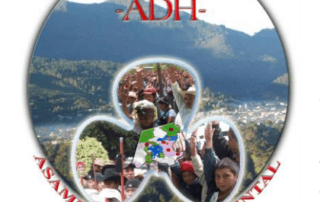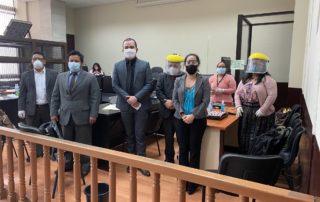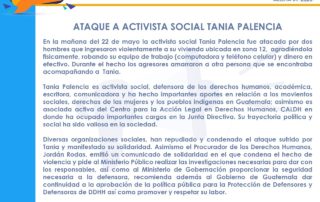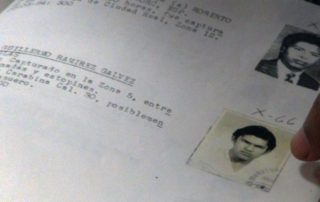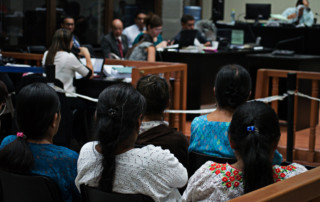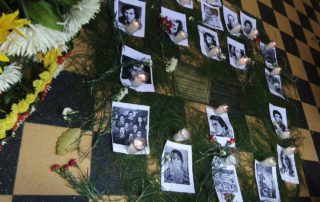Sepur Zarco
On February 26, 2016, indigenous women from the community of Sepur Zarco made history when they and their legal team successfully prosecuted former Guatemalan military officials for sexual and domestic slavery. Based largely on the testimonies of 15 Q’eqchi’ survivors, a Guatemalan tribunal convicted two men—former Military Commissioner Heriberto Valdez Asig and former Colonel Esteelmer Francisco Reyes Girón—of crimes against humanity for sexual and domestic slavery carried out at a military recreation center in the 1980s.
While the defendants faced charges for other crimes committed in the same context, including the forced disappearance of several of the women’s husbands, the trial holds national significance as the first transitional justice case in Guatemala to firmly center the experiences and impacts of sexual and domestic violence against women during the internal armed conflict.
When I became strong enough to be able to say what I had to say, I told the whole truth. That was what gave me strength…The moment came that we had been waiting for, for so long – to see justice.
In-depth NISGUA reports

Q’eqchi’ women set a precedent in Guatemala with first-ever conviction for sexual and domestic slavery.

Report-back from the “Guatemalan Women Healing Towards Justice” tour, featuring Maudi Tzay from the Alliance to Break Silence and Impunity.
In the early 1980s, communities in the Polochic Valley in Guatemala challenged wealthy landowners for legal titles to their ancestral lands. Around the same time, Guatemalan dictatorships constructed several military bases around the region of Sepur Zarco with the support of the U.S. The base built in Sepur Zarco was designated a military recreation center, where troops would return after taking 15-day rotations patrolling the surrounding mountains.
The soldiers at the Sepur Zarco military base disappeared men from the community who were seeking land titles, demonstrating the powerful connections between wealthy elites and the military. The women that survived them were then forced into sexual and domestic slavery for years. The trial illustrated how patriarchy and racism play out on women’s bodies in war. Grounded in the recognition that these systems endure today in Guatemala and the world over, the women survivors prosecuted this case as part of a multi-faceted strategy for social change. To do so they worked with a coalition of feminist, legal, and psychosocial organizations known as the Alliance to Break Silence and End Impunity.

Photo: CPR Urbana
The intergenerational struggle for access to and protection of land
After the verdict, the courts ordered 18 reparations to redress the physical, psychological, and material impacts of the violence. These include increased access to healthcare and education for survivors and community members, and legal reforms to reduce the barriers against survivors of sexual violence. The reparations focused on repairing harm, dissuading future violence, and community healing.
Survivors repeatedly testified to the psychological and economic impact of their husbands’ disappearances and how a lack of land access has perpetuated poverty. To carry out court ordered reparations, the Guatemalan national land registry must grant land titles and prioritize families of those forcibly disappeared while in the process of registering their land. Nonetheless, almost three years after the sentence, survivors have yet to receive titling.

In Solidarity
The Alliance to End Silence and Impunity called upon the international community to stand in solidarity with the women survivors of Sepur Zarco to ensure the legal system respects the sentence. The Alliance made direct requests for accompaniment, reporting, and advocacy to broaden the social impact of the case on a global scale.
Members of NISGUA responded to this call by gathering together to educate themselves and express solidarity with the survivors. We strengthened movements in Guatemala and the U.S. by drawing direct connections with local feminist struggles for gender justice and indigenous solidarity.
Latest from our blog
ADH denuncia la grave crisis de COVID-19 generada por el gobierno
To read in English Lea este comunicado que nuestres compañeres de La Asamblea Departamental de Pueblos de Huehuetenango (ADH) han escrito "ante la grave crisis generada por las medidas tomadas por el gobierno de [...]
May 2020 Solidarity Update
Lawyers of the victims and survivors of the CREOMPAZ case at the hearing on May 18. Photo credit: Dr. Ramón Cadena May 2020 Solidarity Update We are in regular [...]
Alert for aggressions against human rights defender Tania Palencia
[Español abajo] NISGUA denounces the attack on social activist Tania Palencia We are deeply concerned about the attack at the home of social activist Tania Palencia on May 22 . Tania is a human [...]
21 Years After the publication of the Military Diary families of the victims are still seeking justice
A page from the Military Diary. Photo credit: Centro de Medios Independientes. The Military Diary is a 54-page document that lists the names of 183 people who were captured and forcibly [...]
Military accused in the CREOMPAZ case try to get out of pre-trial detention
On May 11, the military José Antonio Vásquez García and César Augusto Cabrera Mejía, accused in the CREOMPAZ case, asked Judge Claudette Dominguez to obtain conditional freedom in the context of the COVID-19 emergency. [...]
Video: Commemorating the National Day of Dignification for Victims of the Internal Armed Conflict
[Español abajo] On February 25th, NISGUA accompanied survivor organizations as they gathered to remember what they survived and those they lost on the National Day of Dignification for Victims of the Internal [...]











